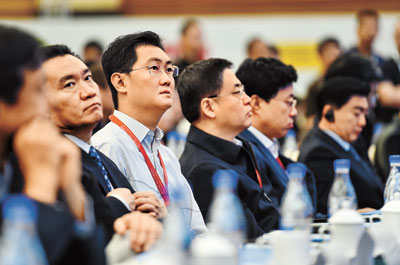
Martin Li
martin.mouse@163.com
LI YANHONG, CEO of Baidu, China’s largest search engine, said at yesterday’s China (Shenzhen) IT Summit that speculative and shortcut-prone outlooks should not be encouraged.
He gave the remarks at a dialogue focusing on the question of where the next source of “tail wind” will come from.
Tail wind, or favorable wind, has become a buzzword in the Internet industry in China, with people keen on looking for new trends in the industry and taking advantage of them.
“The tail wind concept is speculative and dangerous,” said Li. “People should not be encouraged to speculate or seek a shortcut.”
“You can’t fly by doing nothing even when you’re driven by a tail wind,” he said. “Valuable things can be made using the Internet’s means,” said Li.
“Focus on what you’re doing, instead of following suit in a blind manner, and it will definitely pay off.”
Li encouraged people to do what they like and are good at.
Another big name in the IT industry, Ma Huateng, chairman of Shenzhen-based Tencent, said at the dialogue that use of the Internet in a segmented market can give rise to a new business model and a new development space.
“The Internet, especially mobile Internet, enables a direct and real-time link between each of us and services ... mobile Internet makes each industry and service more human-centered,” said Ma. (Continued on P3)
“The manufacturing industry has switched from having a sole focus on making to a dual focus on making and service. In the future, it will become totally service-centered,” said Ma.
Tencent is centered on the development of the social media and content industries, according to Ma, who said people who want to cooperate are welcome to link up with the company to develop other areas.
Ma Yun, founder and chairman of Alibaba Group, shared his views in a pre-recorded video at the beginning of the dialogue.
Ma said the IT industry will go through a transformation to enter the era of data technology (DT).
“DT is not only a technology upgrade, but also a concept upgrade. IT focuses on‘me’and DT focuses on others,” said Ma.
“I believe, in the next ten years, Internet companies which fail to integrate with a traditional industry will go through a tough time. Meanwhile, enterprises in traditional industries will not survive if they fail to integrate with Internet-based thinking,” he said.
The biggest challenge is to develop an Internet-based economy, which means a perfect combination of traditional industries and the IT industry, according to Ma.
|

